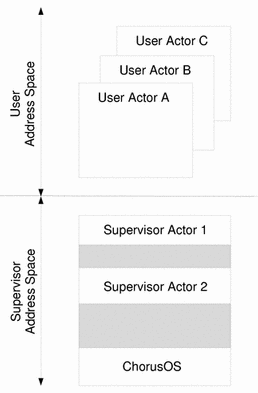User and Supervisor Actors
There are two main kinds of actors which may be run within the ChorusOS operating system environment: user actors and supervisor actors. A user actor runs in its own private address space so that if it attempts to reference a memory address which is not valid in its address space, it will encounter a fault and, by default, will be automatically deleted by the ChorusOS operating system.
Supervisor actors do not have their own fully contained private address space. Instead, they share a common supervisor address space, which means that an ill-behaved supervisor actor can access, and potentially corrupt, memory belonging to another supervisor actor. The common supervisor address space is partitioned between the ChorusOS operating system components and all supervisor actors.
As supervisor actors reside in the same address space, there is no memory context switch to perform when execution switches from one supervisor actor to another. Thus, supervisor actors provide a trade-off between protection and performance. Moreover, they allow execution of privileged hardware instructions and so enable device drivers, for example, to be loaded and run as supervisor actors.
On most platforms, the address space is split into two ranges: one reserved for user actors and one for supervisor actors (see Figure 5-1). As user actor address spaces are independent and overlap each other, the address where these actors run is usually the same, even if the actors are loaded from relocatable binaries. On the other hand, available address ranges in supervisor address space may vary depending on how many and which supervisor actors are currently running. Since the ChorusOS operating system is able to find a slot dynamically within the supervisor address space to load the actor, the user does not need to be aware of the partitioning of the supervisor address space: using relocatable binary files will suffice.
Figure 5-1 User and Supervisor Address Spaces

The ChorusOS operating system offers a way to determine dynamically whether a program is currently running as a user or a supervisor actor:
#include <chorus.h>
int actorPrivilege(KnCap* actorCap,
KnActorPrivilege* old,
KnActorPrivilege* new);
If actorCap is set to the name of an actor,
you can use this API to obtain the privilege of the named
actor. If actorCap is set to the predefined value K_MYACTOR, you can obtain the privilege of the current actor. This
call may also be used to dynamically change the privilege of an actor from
user to supervisor or vice versa.
The following example illustrates a usage of the actorPrivilege() service. It is a small program that retrieves its privilege, without trying to modify it. It prints one message if the actor is running as a user actor, and another if it is running as a supervisor actor.
Example 5-1 Getting Actor Privilege
#include <stdio.h>
#include <chorus.h>
int main(int argc, char** argv, char** envp)
{
KnActorPrivilege actorP;
int res;
/* Get actor's privilege */
res = actorPrivilege(K_MYACTOR, &actorP, NULL);
if (res != K_OK) {
printf("Cannot get the privilege of the actor, error %d\n", res);
exit(1);
}
if (actorP == K_SUPACTOR) {
printf("This actor is running as a supervisor actor\n");
} else {
printf("This actor is running as a user actor\n");
}
exit(0);
}
KnActorPrivilege is the type defined by the ChorusOS operating system to handle the type of an actor. The defined values for the actor type are:
-
K_SUPACTOR: a supervisor actor running in the supervisor address space which can access all privileged kernel calls. -
K_SYSTEMACTOR: a trusted user actor, launched at boot time by the kernel and running in its own user space address, which can access certain privileged kernel calls. -
K_USERACTOR: a user actor running in its user space. It has fewer privileges thanK_SYSTEMACTOR.
- © 2010, Oracle Corporation and/or its affiliates
